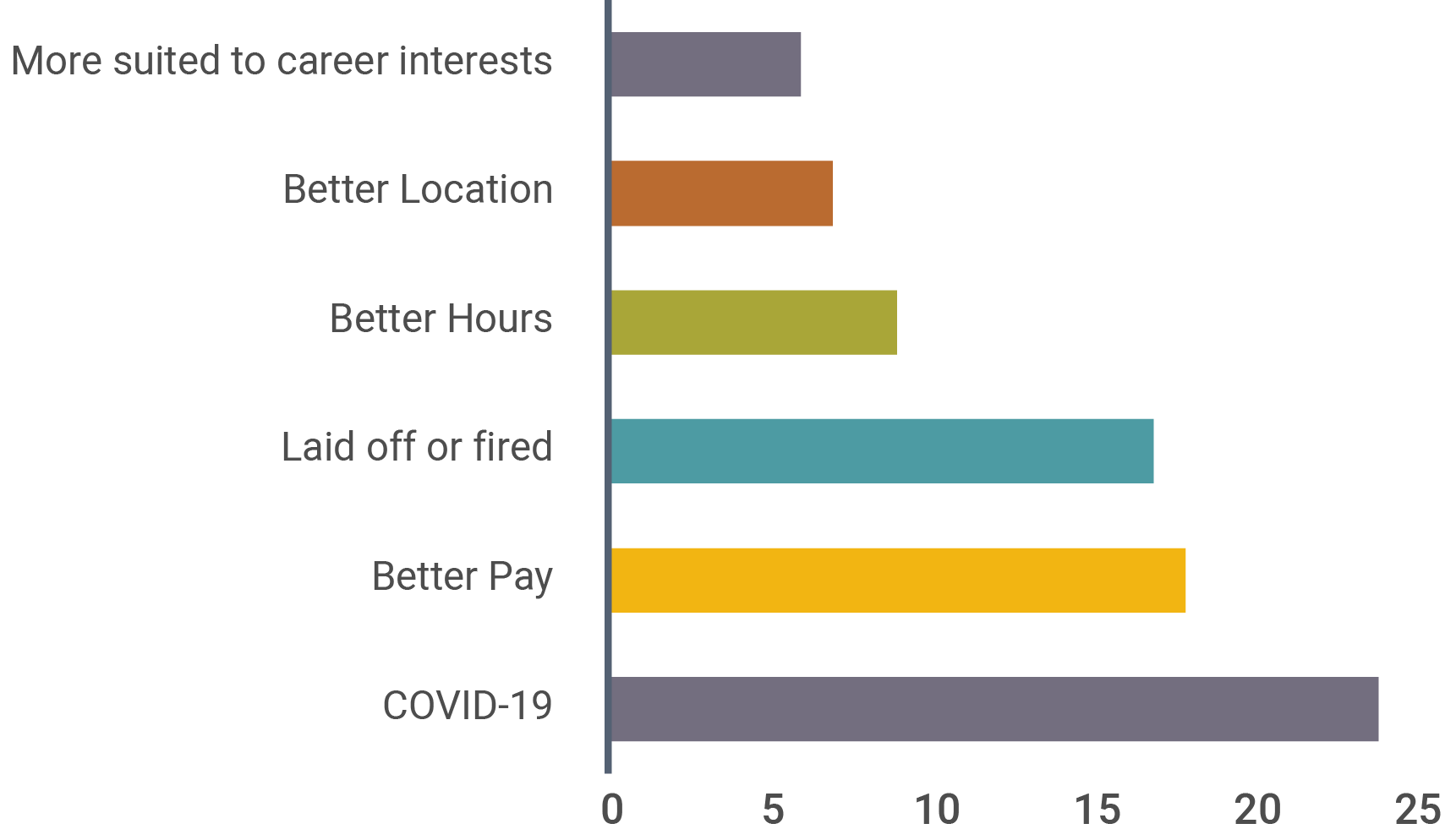
Worker Voices Special Brief: Pursuing Advancement through Personal Investment
By Tiffani Horton, Elizabeth Bogue Simpson
January 10, 2024
The Worker Voices Project, a Federal Reserve System research study launched in 2022, aims to elevate the experiences of workers without four-year degrees during the COVID-19 pandemic. Through 20 focus groups with workers and job seekers conducted from May through September 2022, the study provides a nuanced understanding of worker experiences during a period of rapidly evolving labor market dynamics. The research was published in Worker Voices: Shifting Perspectives and Expectations on Employment (Miller et al. 2023).

Introduction
This special brief is the third in a series of several deeper explorations into themes emerging from the Worker Voices Project research study. The Worker Voices Special Brief: Perspectives on Job Quality, discusses what workers want in terms of quality jobs and employment, including adequate compensation, fair treatment, job security, flexibility, and engagement (Dunne and Wardrip 2023). For some workers, this clarity was born out of a negative experience with employment during the pandemic and has fundamentally changed how they navigate the labor market (Miller et al. 2023).
However, many focus group participants expressed that their limited education or a perceived lack of skills was a barrier to obtain higher quality jobs. As discussed in the Worker Voices Special Brief: Barriers to Employment, lack of formal education is a significant barrier to workers securing quality jobs and employment (Galeano, Rees, and Simpson 2023). Workers without bachelor’s degrees face higher unemployment rates and were more likely to be laid off during the pandemic (US Bureau of Labor Statistics n.d.c.; Parkinson 2020).
Building on the perspectives shared in the earlier two briefs, this brief focuses on how these non-degreed participants worked to create greater economic mobility and obtain higher quality employment. In response to labor market demands and their own perceived limitations, many workers in the focus groups reported seeking additional education and opportunities for skill-building to create new economic opportunities for themselves. When asked how they went about this, focus group participants described relying less on educational institutions, employers, or other aspects of the traditional workforce development system. Rather, our findings suggest that to better navigate the labor market, participants exercised greater job autonomy and pursued unconventional strategies for building skills to secure better jobs and improve their economic mobility. Yet, despite their efforts, participants’ perspectives illustrate the ways they experienced varying and often limited success in securing quality employment.
Participant approaches to improving their employment outcomes
Workers and job seekers in project focus groups primarily took two approaches, sometimes simultaneously, to position themselves for “better” employment outcomes. In this special brief, we define better or improved outcomes as a positive change to one or more elements of job quality identified by workers themselves—treatment, engagement and enjoyment of work, job security, flexibility, and compensation—summarized in Worker Voices Special Brief: Perspectives on Job Quality (Dunne and Wardrip 2023).
Described below, the two approaches are exercising job autonomy (leaving or changing jobs or choosing entrepreneurship) and pursuing credentials and skill-building.
- Exercising job autonomy captures the ways individuals in the study exerted control over their employment because of shifts in their perspective and perceptions of their own value. For example, numerous participants expressed a desire for better quality employment because of their negative experiences during the pandemic, and several described how this caused them to leave their jobs in search of a better one. Some participants even perceived a change in bargaining power in the labor market that increased their confidence in their ability to find a better job, increasing their sense of job autonomy. We also include in this category responses from participants that indicated they wanted to (and in some cases did) become less dependent on traditional employers for income through self-employment.
- Pursuing credentials and skill-building includes participants’ pursuit of some type of education or training, whether formal (for example, college or other coursework towards a credential) or informal (for example, self-guided learning). Our analysis also explores the challenges participants encountered when trying to access and pursue educational opportunities and in translating their efforts to higher quality employment.
This analysis places these two approaches in the context of existing research, highlighting the challenges participants faced and their reported employment outcomes. Overall, focus group participants described themselves as persistent and committed to pursuing self-improvement however they could to improve their employment outcomes and achieve economic mobility.
Exercising job autonomy


Whenever you’re not, like, happy with the position or you feel as though you’re not getting what you deserve, leave.…[A]t the end of the day, we are essential for the business to run.
– Worker Voices participant

In line with trends in the broader economy, participants described how their experiences during the pandemic caused a shift in how they participate in the labor market (Stiglitz 2022). As described in Worker Voices Special Brief: Perspectives on Job Quality, workers reported that the pandemic helped them recognize their own value, causing them to increasingly expect more from employers and leave jobs that did not provide quality employment (Dunne and Wardrip 2023). This trend also exists in the broader labor market. Workers with less education, like those in our sample, are more likely to switch jobs or be more “transient” in the market, and their rate of job switching increased post-pandemic (Kochhar, Parker, and Igielnik 2022).
Setting new boundaries
As a result of their pandemic experiences, several participants expressed that they now demand better treatment from employers. One participant in a frontline job described how their employer treated them as expendable, causing a shift in how they viewed themselves and the treatment they were willing to accept at work.
“There’s a lot of this idea…that you’re…[disposable] and you’re replaceable….[The pandemic] brought light to my own respect, you know, as an individual and my capabilities as an employee… like having my own ability to stand up for myself and say, “No, I’m not willing to do that.”
Some participants noted that employers were unwilling to meet their higher expectations or respect their boundaries. When faced with putting themselves or their families at risk because of a job, several participants in our focus groups stated that they began to prioritize well-being over their jobs for the first time. This change in perspective caused some participants to quit their jobs in search of better opportunities.
“I wanted to make sure that my mental health was taken care of before anything else. And [my employer] didn’t agree with that. So that was a no go.”
“I ended up looking for a new employer because…I didn’t feel safe anymore….I ended up leaving there during the pandemic.”
In fact, approximately one-quarter of our sample reported changing jobs in the previous year. Based on a pre-screening questionnaire, half of these participants attributed this change at least in part to COVID-19. Many also reported changing jobs in pursuit of higher-quality employment that provided better pay, better work hours, a more convenient location, or was more aligned with their career interests (Figure 1). In focus groups, participants reported that in addition to fair compensation, a quality job is one where they are valued, respected, listened to, appreciated, and included in decisions (Dunne and Wardrip 2023). These aspects of a quality job were often not reflected in how workers described their employment experiences during the pandemic.
Figure 1. Frequency of Participant-Reported Motivations for Job Change (n=48)

NOTES
Participants were asked on the pre-session screening questionnaire if they had changed jobs in the past year and if so, asked to select if any of the following were reasons for their job change: COVID-19, laid off or fired, better hours, better pay, or more suited to career interest. Additionally, the “laid off or fired” category includes individuals in the sample who were laid off due to the COVID-19 pandemic. Individuals could select all that were applicable in the screener questionnaire.
Higher expectations in the labor market
In addition to an increased willingness to leave their jobs, some workers noted they began to expect more from employers when looking for a new job. Several participants reported that they were unwilling to accept jobs that did not pay enough or did not extend flexibility in hours or work location, particularly for those living with high-risk family members and caregivers who were dealing with daycare closures (Galeano, Rees, and Simpson 2023). Dissatisfaction with working conditions during the pandemic prompted a rise in job quitting across the nation (Kochhar, Parker, and Igielnik 2022). US workers that have quit positions since 2020 cite reasons like wanting better pay and pursuit of better opportunities (Parker and Horowitz 2022). Worker Voices Project participants echo these reasons. In addition, nearly half of those who left jobs in 2021 reported that childcare issues were a factor, a concern that was also commonly reported by participants (Kochhar, Parker, and Igielnik 2022; Galeano, Rees, and Simpson 2023). Our conversations with study participants revealed that these workers took a much more discerning approach to jobs than they had before the pandemic, choosing not to rush into new opportunities that might not meet their expectations.


The pandemic really taught me patience when it comes to working and not just to jump at any opportunity that comes. Because it might not be the best opportunity for me.
– Worker Voices participant
“In the last maybe year…I’ve been very, very picky about the jobs I’m willing to take…depending on the benefits package and how much they’re paying…especially with inflation right now….I’m pretty specific right now [about] where, time schedule, and pay.”
“[E]ven when it comes to new job positions, and they would be like, oh, the pay is such and such, are you okay with that? Actually, I’m not okay with that.”
Challenges in using job autonomy to secure better jobs
Participants experienced varying levels of success when exercising job autonomy to improve their employment outcomes. As discussed in Worker Voices Special Brief: Barriers to Employment, workers with disabilities, those with justice involvement, and immigrant workers face greater barriers to employment than their peers (Galeano, Rees, and Simpson 2023). Evidence also shows that these workers were disproportionately vulnerable to pandemic impacts on employment (Schur, Rodgers, and Kruse 2021; Schwam, Bushway, and Wenger 2023; Gelatt 2020). Participants facing these barriers often described feeling trapped in lower-quality jobs (Galeano, Rees, and Simpson 2023). And even when they did employ job autonomy, they expressed that doing so did not necessarily yield better outcomes.
“Right now a lot of jobs…are hiring, but…I’ve been a felon, so a lot of times the [non-profit] has had to help me….[I]t’s just really been a lot of jobs I don’t really want to take on.”
“I was having a lot of trouble with my disabilities…so, I left there after a month. Then I actually was like searching for a job for like six months, and then, I worked at McDonald’s for about a month, but I got fired from there because I called out when I was sick.”
However, it was not just workers with personal histories that presented additional barriers to employment that reported challenges in exercising job autonomy. Several participants who did not face these additional barriers to employment expressed that while changing jobs seemed like a way to secure better employment, often it did not materialize. In fact, these participants described regret when they left a job and the need to job hop to find the right fit.
“I regretted my decision [to leave my job] a little bit….[A]s far as going elsewhere, it was the Wild Wild West.”
“I did apply to several jobs. I ended up working two jobs, but one of them…we didn’t have the same core values, and it didn’t work out. So, I left from that job.”
“I actually went to go through different jobs in the city, and I found a lot of issues where either the work environment was toxic…and I didn’t stick through that. I kept looking and looking and working in increments until I found a job that worked for me, and I think that year I worked like nine jobs.”
Self-employment
Self-employment can be another form of autonomy that yields greater flexibility and reduces reliance on employers for income. Workers without bachelor’s degrees, like those in the sample, are generally more likely to cite a lack of flexibility to decide their own hours as a motivator for quitting their job than workers with 4-year degrees (Kochhar, Parker, and Igielnik 2022).
Nearly one in five focus group participants reported being self-employed either in full or in addition to other employment. They pursued self-employment in many ways, including gig work through apps like Instacart, content creation on platforms like Twitch or TikTok, and starting their own businesses. Turning to work on platforms like Uber to cover expenses or supplement their income was a common occurrence around the time of the pandemic; approximately 5.2 million workers entered the gig economy in 2020 and 2021 (Belsie 2023).
As discussed in Worker Voices Special Brief: Barriers to Employment, participants were asked to select if they had experienced any of 12 barriers to employment on the pre-session screening survey, which included affordable childcare, available childcare, citizenship status, COVID-19, criminal convictions, disability, homelessness, lacking skills, language barriers, mental health challenges, substance abuse, and transportation (Galeano, Rees, and Simpson 2023). Participants who were self-employed reported, on average, similar numbers of barriers to employment as other project participants, which may indicate that they pursued self-employment primarily for its perceived benefits rather than in response to having difficulty securing traditional employment.


I want…financial freedom, and I really can’t get that if I’m just working for another company…I never feel as though I’m getting paid what I deserve….So I think that’s another reason why I wanted to be an entrepreneur as well….[I’m] tired of pouring into other people’s cups.
– Worker Voices participant
Many participants expressed that caregiving was particularly challenging during the pandemic period. And the flexibility afforded through self-employment carried an especially high premium for caregivers in our sample—nearly three out of every four participants who reported being self-employed either as their primary or secondary employment were caregivers.
“I have children, so I’m pretty active with them. And during the pandemic…they’re home all the time.…[Working for myself] is just giving you the freedom to dictate my own schedule, to make my own money.”
Additionally, some participants stated that they felt self-employment provided greater financial security because they could not be laid off, furloughed, or fired. Others felt that they saw more direct returns from their efforts when working for themselves.
“I would say quarantine definitely taught me to take some of those side hustles…or personal skills and figure out how to depend on them.…[A]ll I could depend on was myself at some point.”
“It’s not really ideal to be dependent on one source of income. That’s what I realized during the pandemic, because if I didn’t [come up with ways of] making work or making money, I would have been really, really stranded when the job shut down.”
Those in our study who pursued self-employment during the pandemic and early post-pandemic period praised its flexibility and autonomy, which participants described as key elements of job quality. Self-employment and entrepreneurship will be discussed in-depth in a subsequent Worker Voices Project special brief.
Overall, participants experienced varying levels of short-term success when exercising job autonomy to improve their employment outcomes. Simply leaving a job for another or to pursue self-employment was not necessarily enough for participants to secure better employment. And notably, any gig work or self-employment experiences described by participants were too recent to suggest any other long-term employment outcomes such as increased income or sustained increased job satisfaction.
Pursuing credentials and skill-building


I’m trying to do school so I can put some bases down to get a good job.…I can’t just look into a minimum wage job, because with everything rising and inflation…I need something that’s going to sustain [my family].
– Worker Voices participant

Many participants turned to education and skill-building to make themselves more competitive for quality jobs in the labor market. Coupled with exercising job autonomy, the additional skills acquired along with supports provided through educational programs often positioned participants to secure higher-quality jobs.
Obtaining a bachelor’s degree or postsecondary credential is one of the most researched, well-known paths to increased earnings and greater job satisfaction (Carnevale, Cheah, and Wenzinger 2021; Rothwell and Crabtree 2019). Holding a degree or credential often means greater resilience in times of economic distress like the COVID-19 pandemic. It is also associated with moving into a better paying and higher quality job and tends to yield overall greater lifetime earnings (Parkinson 2020; Abel, Florida, and Gabe 2018; Carnevale, Cheah, and Wenzinger 2021).
However, most US workers—more than 60 percent in 2022—do not have a bachelor’s degree (US Census Bureau 2023). This is why exploring the experiences of these individuals without the economic safety net a bachelor’s degree was the focus of the Worker Voices research.
Obtaining valuable skills can provide a route to higher-quality jobs. Skill-building often occurs on the job, through military service, by attending community college, or other alternative routes (Opportunity@Work n.d.). Digital skills, even foundational ones like proficient use of email or time-keeping software, are necessary for today’s jobs (Bergson-Shilcock, Taylor, and Hodge 2023). Yet, nearly one-third of workers lack the foundational digital skills necessary to be successful in employment—and may not have the resources to acquire those skills (Bergson-Shilcock 2020).
Perceived skills barrier
Participants in this study consistently described feeling like their skills were insufficient to secure high-quality jobs or advance in their career. Specifically, more than half of project participants, whether or not they were currently working, noted skills as a perceived barrier to finding or maintaining a better job.
Of note, participants of color in our study were more likely to report skills as a perceived barrier to employment than white participants (Galeano, Rees, and Simpson 2023). Also, self-identified caregivers were more likely to report or discuss a perceived skills barrier. This perceived deficit could be attributed to the challenges caregivers, especially women who perform most caregiving, often face when seeking childcare to engage in the labor market (Schochet 2019). In our study, more than twice as many female caregivers reported skills as a barrier than their male counterparts. Like other participants, caregivers viewed obtaining additional education and skills as an opportunity to overcome this obstacle.


Since I didn’t really have [many] skills and I wasn’t, you know, a college graduate, I was laid off after my first paycheck.
– Worker Voices participant
While skill-development often occurs on the job, some participants highlighted that employers were not investing in them in ways that increased their upward mobility internally or externally in the labor market. Even when employers provide upskilling opportunities, employer-based credentials are rarely valuable outside of the company (Higher Learning Commission 2022).
“As far as the training and you know trying to find something with stability…it was more like when I ask to increase my skills or to grow within the company, to be more valuable in the marketplace…[i]t was more like they just train you to do one task and one task only. And a lot of the times it was like temporary tasks, it wasn’t even nothing that I could even grow.”
To address a perceived lack of skills and any inability to obtain marketable skills on the job, one in four focus group participants discussed pursuing credentials and skill-building during the pandemic through higher education, non-degree credentials, bootcamps, or self-guided learning. Often, participants described training and skill-building as a path to increasing income, finding more stable employment, and pursuing a more meaningful career pathway.
“I also enrolled in online courses, yes. I was able to develop myself during the period; attend business classes….Of course the goal is to make more money.”
“I was bartending before the pandemic…I realized that there was the insecurity of my job….So I’m trying to transition to software development….I’ve been taking some tutorials….I feel like there’s more security in that area.”
“[I’m looking for] a longtime career in something that I enjoy….So I think being a CNA is one foot in the door…and then I can always further my education in maybe something a little different within the medical field.”
Challenges to education and skill building
Affordability is a persistent challenge to completing credentials beyond high school. The cost of higher education has increased over time, while the share of federal financial aid has decreased, leaving students or families to make up the difference (National Center for Education Statistics 2021; Ma and Pender 2022). Several individuals in our focus groups found college to be an inaccessible strategy for improving their economic outcomes. They reported that higher education programs were too expensive or that they would have difficulty covering costs of living while enrolled.
“I definitely do want to go back to school. The only reason why I’m not going right now is because I have a balance on my account.”
For some participants, individual circumstances increased the challenge of pursuing skill-building. Evidence has shown that individuals with personal attributes and histories like disabilities, mental illness, criminal convictions, or undocumented legal status traditionally face additional real or perceived barriers to accessing and completing higher education (Hong 2015; Schindler and Kientz 2013; Stewart and Uggen 2020; Hernandez-Reyes, Williams, and Jackson 2023). In our focus groups, some participants also found that the shift to virtual learning environments during the pandemic posed a new challenge when it came to educational or skill-building pursuits.
“My challenge is if I want to go to school, I had to pay out of state tuition…because I’m DACA.”
“I have ADHD. I have dyslexia. I can’t sit still…I understand that to move forward or to get ahead, you’re supposed to get an education, but what about people like me [for whom] it’s harder to get that education?”
“I definitely do want to go back to school. The only reason why I’m not going right now is because I have a balance on my account.”
“I had just started going to school to try to get my diploma [before the pandemic]….I couldn’t finish school, because like I said, like, everybody’s not familiar with doing everything online.”
Notably, many participants who described successfully overcoming challenges associated with obtaining skills or credentials had previously engaged with a non-profit, educational institution, or municipal government for career development or support services. This finding points to the potential of these organizations to support additional training and facilitate better employment outcomes for those able to access their services.
“I did, in 2021, take a networking and A-plus certification training provided through [the county]….They paid for my classes, and they provided us like with a stipend while we were in class.”
“[This workforce development organization] not only [provides] a certification…but they also connect you with people who can say, hey, you know, are you having issues with groceries, rent, utilities, they have a team dedicated to helping you with that.”
“I got let go. And I didn’t know what else to do…I joined the boot camp through a free college program…I was able to be remote to learn how to code during that…and I was able to find a job since then.”
Alternative routes
In response to challenges to obtain a college degree described above, most of the participants who engaged in education or training opted for alternative routes such as short-term, non-degree credentials like coding bootcamps. Non-degree credentials often take less time and are more affordable than traditional postsecondary degrees (Bahr 2016). And while these credentials may offer higher employment rates and earnings than a high school diploma and position individuals for in-demand jobs, employment outcomes are more often mixed as the value is not retained over time (Ositelu, McCann, and Laitinen 2021; Baum, Holzer, and Luetmer 2020; Carnevale, Cheah, and Wenzinger 2021; Bahr 2016).
Others in the focus groups pursued self-directed education and skill-building by reading books or watching YouTube videos, demonstrating a determination to pursue self-improvement through any means available to them.
“I’ve been doing a lot of studies; been doing a lot of books on sales and people’s management, and I love to watch…videos on YouTube as well.”
“I did try to watch tutorials to learn things…tutorials on internet and YouTube.”
Return on investment
Many of the participants who reported securing higher-quality employment since the pandemic had completed a formal training program, which aligns with research on positive outcomes for sub-baccalaureate individuals with professional certificates (Rothwell and Crabtree 2019).
“[During] lockdown, I was going through a lot of data analysis programs….I [had] to change jobs, and for now, the pay is a little bit better just to, you know, achieve my goals and make my family comfortable.”
According to Opportunity@Work, millions of individuals that are skilled through alternative routes like those described above demonstrate skills for jobs that pay at least 50 percent more than their current job (“STARs” n.d.). Yet, research has shown that many otherwise qualified candidates are rejected because they do not have a college degree (Fuller and Raman 2017). Employers often use degrees or educational requirements in job descriptions to indicate the requirements for a role, and it can be difficult to quantify or signal competencies gained through alternative routes (Grann and Klein-Collins 2021; Higher Learning Commission 2022; Reichlin Cruse et al. 2023).
Even when workers obtained additional skills or education, the investment was sometimes insufficient. Despite efforts to build skills through training programs or online courses, some individuals in the focus groups said that their efforts did not result in better employment.
“I also went to…a program for logistics training and finished the course and still did not receive any employment. Even with that certificate and that background. So I do feel like while some things are given to us, it’s not initially set up for us to actually succeed.”
“I got the education, I got the certifications….I was making all the right moves, but I’m still not getting nothing back, so I don’t know what it is.”
While certain evidence indicates that we may be heading towards a reduction in degree requirements for jobs and employers seem invested in skills-based hiring, our findings indicate that some workers without college degrees continue to experience challenges in the labor market (The Burning Glass Institute 2022; Fuller, Langer, and Sigelman 2022). The workforce development ecosystem is ripe for intervention to address gaps in individual agency, skill alignment, credential accessibility and return on investment, and employer hiring practices to improve employment outcomes for non-degree workers.
Conclusion


There seems to be like this huge gap between the jobs that are available and the jobs that people are looking for…a lot more job openings than people looking for jobs, but still people struggling to find work….[Particularly] on the bottom of the economic spectrum, where someone is making the decision, “Is it worth starting this job and then having to pay for childcare?”
– Worker Voices participant

In trying to find quality jobs and advance in their careers, participants exercised job autonomy and pursued credentials and skill-building. In some cases, individuals described securing better jobs and higher pay, but many did not. Varied experiences with exercising job autonomy and skill-building, along with the lack of reliable outcomes, indicate a possible disconnect between low-wage, sub-baccalaureate workers, and employment opportunities. Addressing this disconnect could improve the efficacy of workers’ and job seekers’ efforts to improve their outcomes and more broadly facilitate greater economic mobility among non-degreed workers.
When participants chose to exercise autonomy over their employment by taking the risk to leave or change jobs, some were unable to significantly improve their circumstances. In addition, many participants responded to challenges in navigating the labor market by deciding to step out of the traditional workforce entirely and into the informal economy or by pursuing skill-building opportunities. However, participants described several barriers to pursuing education and skill-building opportunities, including affordability and personal circumstances that made education and virtual learning more challenging.
Building on existing research related to quality of training outside of traditional higher education, the experiences described in this study suggest a need for closer examination of how employers value non-degree credentials and less formal approaches to skill-building. There are also opportunities to help workers and job seekers better communicate the skills they have obtained to employers and translate those skills to new and better jobs.
Additionally, eliminating hiring practices that work against individuals enables them to experience greater earnings and higher job satisfaction. Many initiatives exist to assist employers with implementing stronger, more inclusive hiring practices that address misalignment between potential talent and employers, like the Reinventing Our Communities cohort program and the Rework America Alliance. These efforts, along with skills-based hiring initiatives that substitute skills or experience for degree requirements, aim to address the mismatch between what employers seek and what workers offer. However, there is still room for broader adoption and improvement of these practices to effectively match employers with talent and meet evolving labor market demands.

Looking forward
While individuals in our sample reported being willing to—and often did—take steps to make themselves more employable, effort alone did not determine the outcomes described by participants. It is unclear if the choices made by project participants will consistently yield higher-quality employment over time, especially as job openings decrease and the unemployment rate begins to increase (US Bureau of Labor Statistics n.d.a.; US Bureau of Labor Statistics n.d.b.). Many questions remain, and there is a need for ongoing qualitative research to further understand from workers themselves how best to bolster their efforts in the labor market toward better opportunities.
Future research can examine topics including:
- Beyond credentials and skill-building, what tools do workers have to improve their employment opportunities?
- What are long-term outcomes for workers participating in the gig economy?
- What are the outcomes when employers implement skills-based hiring? What are the attributes of successful skills-based hiring initiatives?
- How can education institutions and training providers improve delivery to ensure positive outcomes like better employment opportunities?
- How can workers ensure the educational opportunities they are pursuing will deliver a return on investment, are aligned with employer needs, and will result in better employment opportunities?
- How can employers and workforce intermediaries facilitate career progression and economic mobility once workers have secured employment?
As discussed in this brief and in prior Worker Voices Project publications, barriers to employment and challenges facing workers in securing quality employment existed before, during, and beyond the pandemic. There is promising, innovative work underway to better support workers and job seekers and shift the burden of investment to employers, governments, educational institutions, and worker-serving organizations. Still, all have a role to play in improving employment outcomes and facilitating economic mobility for every worker and job seeker.
The views expressed here are those of the authors and do not necessarily reflect the views of the Federal Reserve Bank of Atlanta, the Federal Reserve System, or Fed Communities.
Please cite this work as: Horton, Tiffani and Elizabeth Bogue Simpson. 2024. Worker Voices Special Brief: Pursuing Advancement through Personal Investment. Fed Communities. https://doi.org/10.59695/20240110.
Media inquiries: Contact Monique Broughton Knight, Atlanta Fed.
Research: Please direct inquiries about the research, data, and methodology in this report to Tiffani Horton and Elizabeth Bogue Simpson.
Appendix: Methodology
Full project methodology for the Federal Reserve System’s Worker Voices Project includes detail on project recruitment, sample selection, sample facilitation guides, and coding methodology (Miller et al. 2023). Of note, this project used a convenience sampling method, and participants were primarily recruited through workforce development or other worker-serving organizations. As such, our sample is biased toward workers who may have been seeking to improve their outcomes through their contact with such organizations. The focus group sessions and pre-session screener questionnaire covered a variety of work-related topics, several of which focus on the efforts to improve employment outcomes examined in this brief.
This special brief analyzes two sources of data—the pre-session demographic questionnaire that was used to determine participant eligibility, and full transcripts from 19 focus groups conducted virtually between May and September 2022.
The authors used thematic, inductive content analysis on the transcripts to identify commonly discussed subjects related to improving employment outcomes as described by project participants (Proudfoot 2023; Dunne and Wardrip 2023). In particular, this brief examines the 90 references to “improving or improved employment opportunities” found in each focus group and coded during the initial inductive coding phase. Sub-codes that were analyzed for this brief include references to formal training and informal training.
The questionnaire contained demographic information that was used in conjunction with focus group codes to determine if some populations were more likely to engage in formal training, informal training, or be self-employed. Additionally, the questionnaire asked if participants had experienced any of the following barriers to employment: disability, mental health challenges, criminal convictions, substance abuse, homelessness, citizenship status, language barriers, COVID-19, lacking skills, transportation, available childcare, affordable childcare, and other. Responses to this question along with mentions of skills barriers coded from focus group transcripts were used to analyze the prevalence of this barrier in our sample and the characteristics of participants who reported experiencing that barrier. This information informed findings on skill-building.
Additionally, the questionnaire asked if the participant had changed jobs in the last year and if so, they were asked to select as many as applied from the following list of reasons for changing jobs: COVID-19, laid off or fired, better pay, better hours, better location, more suited to career interests, prefer not to say, and other. This information informed findings on job autonomy.
Acknowledgements
The authors would like to thank the focus group participants whose experiences and contributions formed the foundation for the Worker Voices Project, both generally and for this brief specifically. We would also like to thank the following people for their feedback and contributions to this brief.
Ann Carpenter, Atlanta Fed
Sarah Miller, Atlanta Fed
Carl Van Horn, John J. Heldrich Center for Workforce Development
Sergio Galeano, Atlanta Fed
Merissa Piazza, Cleveland Fed
Keith Wardrip, Philadelphia Fed
References
Abel, Jaison R., Richard Florida, and Todd M. Gabe. 2018. “Can Low-Wage Workers Find Better Jobs?” Staff Report No. 846. Federal Reserve Bank of New York. https://www.ssrn.com/abstract=3164963.
Bahr, Peter Riley. 2016. “The Earnings of Community College Graduates in California.” Center for Analysis of Postsecondary Education and Employment. https://files.eric.ed.gov/fulltext/ED574809.pdf.
Baum, Sandy, Harry Holzer, and Grace Luetmer. 2020. “Should the Federal Government Fund Short-Term Postsecondary Certificate Programs?” https://www.urban.org/research/publication/should-federal-government-fund-short-term-postsecondary-certificate-programs.
Belsie, Laurent. 2023. “The Evolving Role of Gig Work during the COVID-19 Pandemic.” National Bureau of Economic Research. https://www.nber.org/digest/20238/evolving-role-gig-work-during-covid-19-pandemic.
Bergson-Shilcock, Amanda. 2020. “The New Landscape of Digital Literacy.” National Skills Coalition. 2020. https://nationalskillscoalition.org/resource/publications/the-new-landscape-of-digital-literacy/.
Bergson-Shilcock, Amanda, Roderick Taylor, and Nye Hodge. 2023. “Closing the Digital Skill Divide.” National Skills Coalition. https://nationalskillscoalition.org/resource/publications/closing-the-digital-skill-divide/.
Carnevale, Anthony P., Ban Cheah, and Emma Wenzinger. 2021. “The College Payoff: More Education Doesn’t Always Mean More Earnings” Georgetown University Center on Education and the Workforce. https://cew.georgetown.edu/wp-content/uploads/cew-college_payoff_2021-fr.pdf.
Dunne, Theresa, and Keith Wardrip. 2023. “Worker Voices Special Brief: Perspectives on Job Quality.” Fed Communities. https://www.doi.org/10.59695/20230925.
Fuller, Joseph, Christina Langer, and Matt Sigelman. 2022. “Skills-Based Hiring Is on the Rise.” Harvard Business Review. February 11, 2022. https://hbr.org/2022/02/skills-based-hiring-is-on-the-rise.
Fuller, Joseph, and Manjari Raman. 2017. “Dismissed by Degrees: How Degree Inflation Is Undermining U.S. Competitiveness and Hurting America’s Middle Class.” https://www.hbs.edu/ris/Publication%20Files/dismissed-by-degrees_707b3f0e-a772-
40b7-8f77-aed4a16016cc.pdf.
Gelatt, Julia. 2020. “Immigrant Workers: Vital to the U.S. COVID-19 Response, Disproportionately Vulnerable.” Migration Policy Institute. https://www.migrationpolicy.org/research/immigrant-workers-us-covid-19-response.
Grann, Jeff, and Rebecca Klein-Collins. 2021. “From Degrees to Competencies: What A Shift to Competencies Could Mean for Employers and Students.” October 19, 2021. https://www.cael.org/news-and-resources/competency-transparency-2.
Hernandez-Reyes, Jessie, Brittani Williams, and Victoria Jackson. 2023. “Higher Education Access and Success for Undocumented Students Start with 9 Key Criteria.” The Education Trust. https://edtrust.org/wp-content/uploads/2014/09/UndocuReport_Combined_FINAL_2.pdf.
Higher Learning Commission. 2022. “Evolving: Accreditation and the Credential Landscape.” https://download.hlcommission.org/initiatives/2022StakeholdersRoundtablePapers.pdf.
Hong, Barbara S. S. 2015. “Qualitative Analysis of the Barriers College Students With Disabilities Experience in Higher Education.” Journal of College Student Development 56 (3): 209–26. https://www.doi.org/10.1353/csd.2015.0032.
Igielnik, Ruth. 2021. “A Rising Share of Working Parents in the U.S. Say It’s Been Difficult to Handle Child Care during the Pandemic.” https://www.pewresearch.org/fact-tank/2021/01/26/a-rising-share-of-working-parents-in-the-u-s-say-its-been-difficult-to-handle-child-care-during-the-pandemic/.
Kochhar, Rakesh, Kim Parker, and Ruth Igielnik. 2022a. “Majority of U.S. Workers Changing Jobs Are Seeing Real Wage Gains.” Pew Research Center. https://www.pewresearch.org/social-trends/2022/07/28/majority-of-u-s-workers-changing-jobs-are-seeing-real-wage-gains/.
Ma, Jennifer, and Matea Pender. 2022. “Trends in Student Aid, 2022.” College Board Research. https://research.collegeboard.org/media/pdf/trends-in-college-pricing-student-aid-2022.pdf.
Miller, Sarah, Merissa Piazza, Ashley Putnam, and Kristen Broady. 2023. “Worker Voices: Shifting Perspectives and Expectations on Employment.” Fed Communities. https://doi.org/10.59695/20230524.
National Center for Education Statistics. 2021. “Digest of Education Statistics, 2021.” National Center for Education Statistics. https://nces.ed.gov/programs/digest/d21/tables/dt21_330.10.asp?current=yes.
Ositelu, Monique O., Clare McCann, and Amy Laitinen. 2021. “The Short-Term Credentials Landscape: What We See and What Remains Unseen.” New America. https://eric.ed.gov/?id=ED614528.
Parker, Kim, and Juliana Menasce Horowitz. 2022. “Majority of Workers Who Quit a Job in 2021 Cite Low Pay, No Opportunities for Advancement, Feeling Disrespected.” Pew Research Center (blog). March 9, 2022. https://www.pewresearch.org/fact-tank/2022/03/09/majority-of-workers-who-quit-a-job-in-2021-cite-low-pay-no-opportunities-for-advancement-feeling-disrespected/.
Parkinson, Cody. 2020. “COVID-19, Educational Attainment, and the Impact on American Workers : Monthly Labor Review: U.S. Bureau of Labor Statistics.” September 2020. https://www.bls.gov/opub/mlr/2020/beyond-bls/covid-19-educational-attainment-and-the-impact-on-american-workers.htm.
Proudfoot, Kevin. 2023. “Inductive/Deductive Hybrid Thematic Analysis in Mixed Methods Research.” Journal of Mixed Methods Research 17 (3): 308–26. https://doi.org/10.1177/15586898221126816.
Reichlin Cruse, Lindsey, Jennifer Stiddard, Roderick Taylor, and Jeannine LaPrad. 2023. “The Non-Degree Credential Quality Imperative.” National Skills Coalition. https://nationalskillscoalition.org/resource/publications/the-non-degree-credential-quality-imperative/.
Rothwell, Jonathan, and Steve Crabtree. 2019. “Not Just a Job: New Evidence on the Quality of Work in the United States.” Gallup, the Bill & Melinda Gates Foundation, Omidyar Network, and Lumina Foundation. https://www.gallup.com/education/267650/great-jobs-lumina-gates-omidyar-gallup-quality-download-report-2019.aspx.
Schindler, Victoria P., and Mary Kientz. 2013. “Supports and Barriers to Higher Education and Employment for Individuals Diagnosed with Mental Illness.” Journal of Vocational Rehabilitation 39 (1): 29–41. https://www.doi.org/10.3233/JVR-130640.
Schochet, Leila. 2019. “The Child Care Crisis Is Keeping Women Out of the Workforce.” Center for American Progress (blog). March 28, 2019. https://www.americanprogress.org/article/child-care-crisis-keeping-women-workforce/.
Schur, Lisa, Yana an der Meulen Rodgers, and Douglas L. Kruse. 2021. “COVID-19 and Employment Losses for Workers with Disabilities: An Intersectional Approach.” Working Paper #2021-2. The Center for Women and Work Working Paper Series. Rutgers University. https://smlr.rutgers.edu/sites/default/files/Documents/Centers/CWW/Publications/draft_covid19_and_disability_report.pdf.
Schwam, Daniel, Shawn Bushway, and Jeffrey B. Wenger. 2023. “The Impact of the COVID-19 Pandemic on Workers with a Criminal History.” Monthly Labor Review. U.S. Bureau of Labor Statistics. https://doi.org/10.21916/mlr.2023.1.
STARs.” n.d. Opportunity@Work. Accessed September 14, 2023. https://opportunityatwork.org/stars/.
Stewart, Robert, and Christopher Uggen. 2020. “Criminal Records and College Admissions: A Modified Experimental Audit. ”Criminology 58 (1): 156–88. https://doi.org/10.1111/1745-9125.12229.
Stiglitz, Joseph E. 2022. “COVID Changed the World of Work Forever – Inequality Got Much Worse.” Scientific American, March 1, 2022. https://www.scientificamerican.com/article/covid-changed-the-world-of-work-forever/.
The Burning Glass Institute. 2022. “The Emerging Degree Reset.” https://www.burningglassinstitute.org/research/the-emerging-degree-reset.
US Bureau of Labor Statistics. n.d.a. “Civilian Unemployment Rate.” Accessed September 20, 2023. https://www.bls.gov/charts/employment-situation/civilian-unemployment-rate.htm#b.
US Bureau of Labor Statistics. n.d.b. “JOLTS Home.” Accessed September 18, 2023. https://www.bls.gov/jlt/.
US Bureau of Labor Statistics. n.d.c. “Unemployment Rates for Persons 25 Years and Older by Educational Attainment.” U.S. Bureau of Labor Statistics. Accessed September 19, 2023. https://www.bls.gov/charts/employment-situation/unemployment-rates-for-persons-25-years-and-older-by-educational-attainment.htm.
US Census Bureau. February 16, 2023. “Educational Attainment in the United States: 2022.” https://www.census.gov/data/tables/2022/demo/educational-attainment/cps-detailed-tables.html.
US Chamber of Commerce Foundation. n.d. “Talent Finance.” Accessed September 18, 2023. https://www.uschamberfoundation.org/talentfinance.


